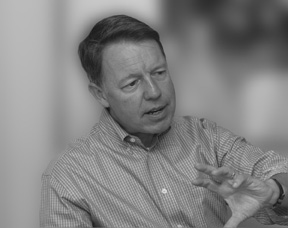
The Rhodes scholar’s “relentless focus on the facts, the law, and the constitution” saved Bill Clinton’s Presidency. Now that his most famous client has departed the White House, what’s on the mind of the man many call “the smartest lawyer in Washington?”
Magazine
Fall/Winter 2001
30
Minutes with David Kendall

by Jim Amidon
No Wabash College alumnus has been more involved in late 20th-century United States history than David E. Kendall.
He’s been in and out of the national media spotlight since he graduated from Wabash in 1966—even before, when he spent the summer of 1964 with Freedom Riders registering African-American voters in Mississippi.
The College’s last Rhodes Scholarship recipient earned a master’s
degree in English literature at Oxford University. He earned his law degree
at Yale in 1971, where he met Hillary Rodham and Bill Clinton and developed
a friendship that would continue over the next 30 years.
He completed a clerkship for Supreme Court Justice Byron White the following
year. After a tour on active duty in the Army, Kendall began work as a
civil rights lawyer with the NAACP Legal Defense and Education Fund in
1973 and litigated several anti-capital punishment cases. He argued successfully
before the Supreme Court in the 1977 landmark case Coker v. Georgia, a
decision that forbade the death penalty for non-murder crimes on the basis
that it was “grossly disproportionate and excessive punishment."
His belief that the death penalty “demeans society” compelled
his defense of murderers Gary Gilmore, John Spenkelink, and others. While
Gilmore agreed to be executed, Spenkelink, whose appeal was driven by
Kendall, was the first person involuntarily put to death in the United
States in 12 years. In a 1979 speech at Wabash, a youthful Kendall argued
that Americans only put up with the death penalty because it was done
under a “cloak of secrecy.” He also predicted that, by the turn
of the century, the death penalty would be abolished on moral grounds.
He joined the high-powered Washington law practice of Williams & Connolly
in 1978, a firm known for its discretion. Kendall worked closely with
senior partner Edward Bennett Williams and began a long career of First
Amendment defense. His clients included publications ranging from the
National Enquirer to the National Review, from Playboy to the Washington
Post. Kendall led the Post’s successful 1985 defense in a $1.8 million
libel suit brought by Mobil Oil President William Tavoulareas. The U.S.
Court of Appeals judge who wrote the decision in the 7-1 appellate victory
for the Post was none other than Kenneth Starr.
Kendall is known as a voracious reader and has been dubbed the “busiest”
and “smartest” lawyer in Washington. And he may be the beltway’s
quietest major player. He had been President Clinton’s attorney for
months before anyone outside Williams & Connolly knew it. Only when
the White House announced that the documents from the late Deputy White
House Counsel Vincent Foster’s former office had been moved to Kendall’s
office did the world find out that he was representing the First Couple.
Steve Umin, a W&C senior partner, once publicly questioned what the
Whitewater and subsequent impeachment trials had done to Kendall’s
personal life. Kendall and his wife, Anne, a psychologist, are the parents
of three children—Matthew, Elizabeth, and Will. He credits his family
with keeping his ego in check during the media circus that enveloped his
life in the late 1990s.
With Whitewater and impeachment largely behind him, Kendall has once again
stepped into the spotlight. His latest interest lies in intellectual property
issues with regard to the new media, the Internet, and the protection
of original, creative materials on CDs, DVDs, and the Internet.
Wabash Magazine has been anxious to talk with Kendall since his
last visit to Wabash for a lecture on politics and the media in early
1995. The events of the last six years led us to wait for an interview
until Kendall returned in early September for his 35th class reunion.
Wabash Director of Public Affairs Jim Amidon ’87 sat down to talk
with him just three days before the tragic terrorist attacks in New York
City, Washington, and Pennsylvania.
“It was immediately clear that Kendall has a real fondness for Wabash
and likes to return when his schedule permits, and that everything we’ve
read about him in terms of intellect is true,” Amidon says. “He
is also said to be a lousy interview because he’s so discreet, but
I found him to be perfectly open and engaging. Knowing he wouldn’t
violate attorney-client privilege, we chose not to focus on President
Clinton, and instead asked a wide range of questions we thought the average
Wabash alumnus would want to ask.”
Return to the table of contents
